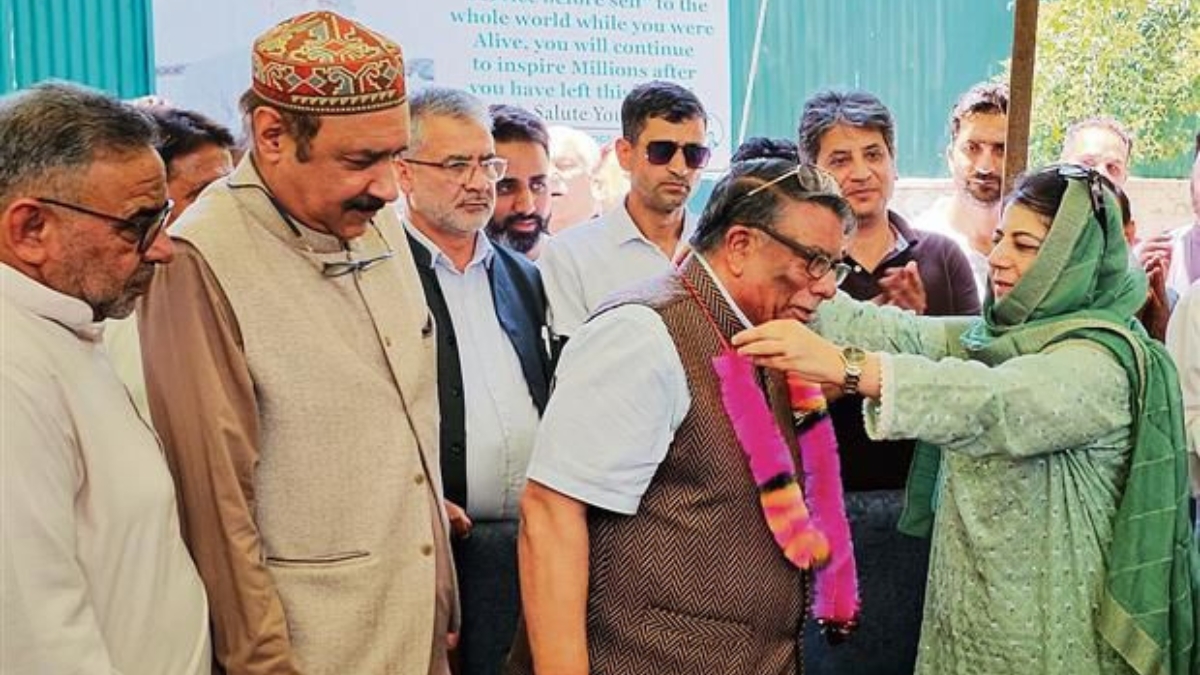Srinagar: Syed Ali Shah Geelani has robustly allayed speculation he plans to retire from active duty as Kashmir’s arch secessionist and said the idea of naming a successor to man, the separatist front hasn’t yet occurred to him.
“The Almighty has blessed me with good health and there will be no let-up in my struggle to liberate our people from Indian imperialism,” Geelani, 82 and ailing, told
The Telegraph in an exclusive hour-long conversation at his Hyderpora residence on the outskirts of town.
He added, a touch wistfully, that he can’t see his dream being fulfilled anytime in the near future and he could well not live to see the day.
“I may not be around to see Kashmir free, but the cause and the movement will live,” he said. “I cannot put a time-line on how long, but I can tell you the will of the people of Jammu and Kashmir will become reality one day because it is just aspiration.”
Geelani was preparing to leave for his north Kashmir pocketborough of Sopore, permission for which had been granted for the first time after month-long restrictions during Ramazan. A police guard stood outside his gateway monitoring entry and exit, and not far, stood an unmarked vehicle which was probably detailed as shadow on his movements.
“I think I have set some sort of record for the number of jummas (Fridays, the Muslim Sabbath) I have spent under house arrest courtesy the Government of India, more than a hundred Fridays, they tell me, but keeping me in jail or housebound is not going to demoralise this movement.”
Asked who would eventually take over reins from him, Geelani sounded sanguine. “I do not know, whoever the party (Tehrik-e-Hurriyat) decides, but this is not a movement of leaders,this is a movement of the people, every Kashmiri will participate in waging the struggle against India’s forced military occupation of our homeland.
“The Indian Army cannot control Kashmir forever, your government cannot kill the sentiment for freedom with the gun.”
He appeared annoyed that the name of his son, Syed Naeem Geelani, has come up as possible successor. “All sorts of wild allegations have been made about me with regard to my son. I am not going to name or nominate any successor, you can take it from me in writing. That question is for the party to decide when the time comes.”
Naeem Geelani, a doctor by training, returned quietly late last year after more than a decade in Pakistan. The younger Geelani had allowed his Indian passport to lapse while in Pakistan and for a while the government had denied him renewal of travel documents.
However, backdoor negotiations whose content is not known, resulted in the issuance of one-way travel arrangements being granted to him. “My son’s decision to return home should be seen strictly in the personal context,” Geelani said. “Should a man furnish specific reasons for wanting to come home, is that not only natural?”
At this point, Geelani impatiently readjusted the trademark “karakul” cap on his head and gestured to the clock in his bare living room. “I must be going,” he said, “Is there anything else you wanted to ask?”
A timely tray of “kahva” (Kashmiri tea) saved the meeting an abrupt end. But Geelani was angered enough by then to fume on unilaterally. “The Indian occupation of Kashmir is a barbaric act, it must end,” he railed.
“Our people are being butchered, our youth are been arrested in droves and being sent to jails elsewhere so they can be tortured, unending curfews are imposed on us, entire generations of Kashmiris are being put to ruin, tell your people they must end this if they believe in democracy.”
At the very hint that elections have been held in Kashmir, the last few with huge voter participation, Geelani turned incensed. “These are fraudulent affairs, everybody knows that. I have contested elections myself and there came a point I realized that contesting elections was no means to a final settlement of our problem.
“Those who claim to be elected, and those that govern, both the National Conference and the PDP, are actually hands that feed the occupying forces. Elections have no meaning in a place you govern with military might.”
He did not regret forsaking elections, or a chance to govern Kashmir as elected head, he said. “What is the point of seeking election under foreign rule?” he asked. “I have no misgivings, none whatsoever, about my chosen path because the path of self-determination is the only one.”
His kahva ignored and cold in the cup, Geelani turned to defend the stone-pelters in the same breath.
“The allegation is we are violent. Have you ever seen me move around with a gun, or even a stick? The arms in Kashmir are all with your security forces. And our only means of self-defence is stones. That is not violence, that is a defence mechanism, the only one left to us, because we are not even allowed peaceful protest in this place, we are not allowed to express our will.”
That said, he motioned to an aide and got up to leave.
 Sankarshan Thakur
Sankarshan Thakur







